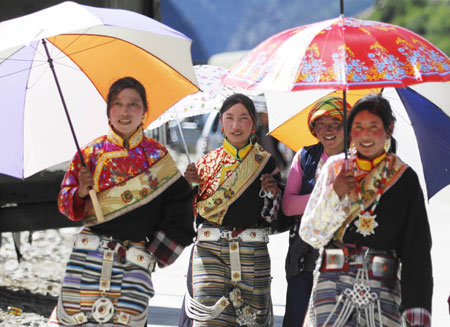Yangdron quietly stands by as her mother, dressed in a cotton-padded Tibetan costume, crawls across the ground and kowtows in front of the Potala Palace in downtown Lhasa.
The young woman gets down on her knees just once and touches her head lightly to the ground. She waits in silence until her mother finishes a long prayer, and gently sweeps away the dust from the old woman's chest and knees.
Unlike her mother, the young woman sports a purple down coat, blue jeans and stylish hairdo.
 |
|
Girls of the Tibetan ethnic group attend a festival in Nyingchi, southwest China's Tibet Autonomous Region, July 17, 2008. (Xinhua Photo) |
A native Tibetan, Yangdron was born and brought up in Lhasa but studied information science for four years at the Beijing-based Central University of Nationalities. Now in her 20s, she works at the Bank of China in Lhasa.
"Which part of Beijing are you from?" she asks in fluent Mandarin, interested to meet someone from the city she once knew so well. "Haidian District? That's where my university is."
The chitchat is cut short as Yangdron's mother wants to buy groceries. "It's the fifth day of the Tibetan New Year, and we've got guests today," she says apologetically.
In Lhasa, capital of southwest China's Tibet Autonomous Region, fashion, the Internet, foreign languages and opportunities to study abroad are no longer novelties.
"Young Tibetans, the twenty-somethings, prefer casual clothes to traditional costumes and they are the bulk of our clients," says cashier Shi Shumei at Yishion, a casual wear outlet in downtown Lhasa's Beijing Road.
Beijing Road, which links the city's two major landmarks – the Jokhang Temple and the Potala Palace -- is one of the city's busiest commercial streets. With voguish stores selling Nike and Kappa, Italian ice-cream, coffee and pastries, cars ranging from the Chinese-made Chery to Land Rovers parked on either side, it is like any other Chinese city, except for the Tibetan drug stores with huge posters promoting traditional recipes to treat altitude sickness.
With temperatures still below freezing in early spring, even the elderly are sporting "North Face" jackets over their costumes as they walk along, beads in one hand and prayer wheel in the other.
This ancient city, meaning "holy land" in Tibetan, is apparently merging into the globalized world, though Buddhist traditions are still observed by pilgrims, young and old, and in the suffocating smoke of incense burnt at the lamaseries.
Police officers and soldiers of the People's Liberation Army (PLA), who patrol Lhasa streets, guns in hand, remind everyone of a violence that erupted on March 14 last year. Almost a year later, the events still overshadow the city and its people.
Four-year-old Tenzin Tsepel remembers little of last year's riots when mobs set fire to the same stores she's passing today, but her mother Zhang Guilin, a doctor from the People's Hospital in Lhasa, says she feels safe to see so many policemen and PLA soldiers.
"It's stressful indeed to see them holding guns. But that's for our own safety. It's very kind of them to be here -- many of the soldiers are just 18 or 19 years old."
Zhang's mother is a native Tibetan and her father is Han, the most populous Chinese ethnic group. She speaks Tibetan and Mandarin, but her daughter speaks only Mandarin.
"I hope she will grow up to study just like her sister," Zhang says proudly of her elder daughter, an economics major at Shanghai's Tongji University. "She speaks perfect Tibetan, Mandarin, English and is now studying French in order to compete for a two-year government-sponsored program in France."
Most primary school students in Lhasa are encouraged to work hard in order to enter middle schools in 21 Chinese cities, including Beijing, Shanghai and Chengdu. "That's a stepping stone to college," says Zhang.
Yet the competition is fierce. Last year, only 1,700 out of Tibet's 60,000 primary school graduates were admitted to Tibetan schools outside the region, according to Tibet's regional education department.
To date, about 15,000 Tibetans have graduated from universities elsewhere in the country and secured jobs in Tibet.
"Little Sun Kindergarten of Art." Tenzin Tsepel pronounces the name of her kindergarten. Her father, a Tibetan musician, hopes she will also excel in art, says Zhang.
While young Tibetans dream of the wide world beyond the plateau, many other Chinese have happily moved in to start a business, or just to experience a different culture.
"I heard so many exciting stories about Tibet that I finally decided to see it for myself," says Yang Lijun, 27, sitting with at least 10 backpackers in the sun outside the Jokhang Temple. "I love this place. I should have come 10 years ago."
Yang, who formerly worked as secretary and insurance company clerk in the southern boom city of Guangzhou, says she might as well quit her job and stay in Lhasa. "The locals call us 'Lhasa floaters'. That suits me fine."
(Xinhua News Agency March 3, 2009)